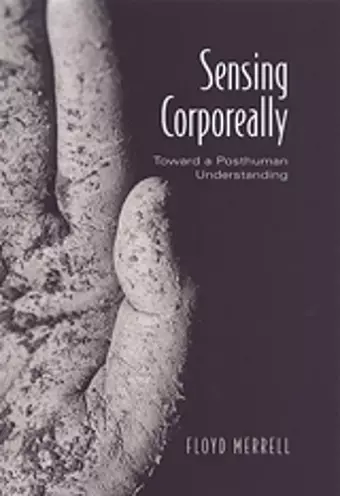Sensing Corporeally
Toward a Posthuman Understanding
Format:Hardback
Publisher:University of Toronto Press
Published:19th Apr '03
Currently unavailable, and unfortunately no date known when it will be back

'The author's main reference is Peircean semiotics and its developments, and Merrell himself may be considered as one of today's main representatives of such scholarship ... This [book] offers a significant contribution to cognitive semiotics which is reproposed not separately from a new approach to the human ... It offers an original and highly systematic development of the problems treated by Pierce and their updating in the light of today's research in the fields of philosophy, semiotics, and the sciences.' -- Susan Petrilli, Professor in Semiotics, University of Bari, Italy 'Merrell's book has a great deal to offer for the articulation of the new and much needed paradigm [of understanding] ... One of the pleasures of Merrell's writing is how he manages to pull everything together into a coherent whole. Readers ... will put the book down after finishing it with a great deal of satisfaction and with the realization that it was ingeniously composed.' -- Nathan Houser, Professor of Philosophy, Director and General Editor, Peirce Edition Project, Indiana University-Purdue University, Indianapolis
Focusing on analogical sensing, rather than digital reasoning, Merrell argues that human sensation and cognition should be thought of in terms of continually changing signs that can be accounted for in terms of topological forms.
In Sensing Corporeally, Floyd Merrell argues that human sensation and cognition should be thought of in terms of continually changing signs that can be accounted for in terms of topological forms. Focusing on qualitative and analogical sensing, rather than quantitative and digital reasoning, Merrell begins by reflecting on the concept of consciousness as developed by neurologist Antonio Damasio, whose work in turn reflects Charles Peirce's conception of the sign. By expanding Peirce's notion of the sign in light of Damasio's work, as well as that of Oliver Sacks and the Argentine fabulist Jorge Luis Borges, Merrell demonstrates the importance of the relationship between cognition, consciousness, and fantasy. The philosophy of science espoused by Michael Polanyi, and the analytic and postanalytic philosophies of Donald Davidson, Nelson Goodman, Hilary Putnam, and Richard Rorty are also explored in light of what they bring to Peircean concepts of vagueness and generality, inconsistency and incompleteness, and abduction, induction, and deduction. Merrell concludes by moving to the conceptual world of biologist Jakob von Uexküll and his Umwelt
Merrell aims to overcome linear, mechanical thinking by underlining the role of the body and, in turn, the role of feeling and sensing, in the development of cognitive processes. Sensing Corporeally is thus a forceful and timely challenge to traditional models of human understanding.
ISBN: 9780802037046
Dimensions: 234mm x 157mm x 33mm
Weight: 706g
400 pages